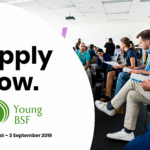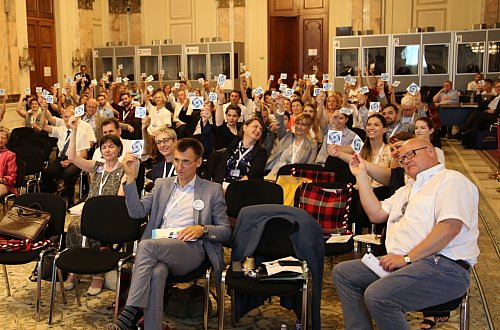LET’S PARTICIPATE – PUSHING FORWARD YOUTH PARTICIPATION AT THE 6TH DANUBE PARTICIPATION DAY
On 26 June 2019, Priority Area 10 “Institutional Capacity and Cooperation” organised in cooperation with the Danube Civil Society Forum/Foster Europe, Agapedia Foundation and the Federation of Social NGOs in Transylvania the 6th edition of the Danube Participation Day in Bucharest back to back with the 8th EUSDR Annual Forum.
YOUTH EMPOWERMENT FOR A PROSPEROUS FUTURE
The on-going revision of the EUSDR Action Plan is supposed to give new impetus for development in the Danube Region. In the course of the procedure both National Coordinators and Priority Area Coordinators of the Danube Strategy agreed that development for durable and viable well-being needs an intergenerational approach that ensures suitable, innovative and creative solutions for the future.
In this spirit, this year’s Danube Participation Day addressed the topic “Youth – Participation – Empowerment” and discussed challenges and perspectives for young people living in the Danube Region and pre-requisites to involve them in shaping and implementing the Danube Strategy. Over 120 participants representing different age groups exchanged on opportunities for empowerment for active engagement and ways of participation and collaboration.
CHANCES AND ASPIRATIONS OF YOUNG PEOPLE IN THE DANUBE REGION – A REALITY CHECK
In the opening keynotes Ruxandra Oprica from FAST Romania and Miran Lavric from the University of Maribor offered some insights into the state of play in the social environment of youngsters in the Danube Region.
Ruxandra Oprica presented her experiences from her work with young people at FAST Romania. FAST Romania is a non-profit organisation working with disadvantaged children with a special focus on educational programs for children living in rural areas in Romania. In her keynote, Ruxandra Oprica highlighted the success factors for the empowerment of young people and structural needs to ensure young people’s connection to an active and constructive contribution to raise their quality of life.
Miran Lavric drew the attention to major finding of the Youth Study South-East Europe 2018/2019 that collected data on youth and education employment, world views, socio-political values, participation, mobility and migration, family, leisure as well as use of information and communication technologies. Miran Lavric provided insights into attitudes and explanations and pre-requisites for participation and empowerment of young people in South-East Europe. Based on the collected data, Miran Lavric stressed the role of (civic) education, the stimulation of international mobility, the promotion of civic engagement and volunteering, the strengthening of youth representative bodies and the role of trust in public and political institutions as critical factors for meaningful and sustainable youth involvement.
PAVING THE WAY FOR YOUTH PARTICIPATION
World Café sessions offered the opportunity to discuss needs and possible ways as well as good practices of youth of youth participation. The format facilitated exchange among different age groups on thematic areas such as environment and sustainability, employability and education, social innovation and entrepreneurship, connectivity and digitalisation. Additionally, the discussions addressed structural challenges such as financing, information flows within the Danube Strategy, participation, safeguarding the future of National Participation Days and Danube Participation Days as well as cross-border cooperation. The participants provided their experience and perspectives on the different topics in order to define steps and measures needed to facilitate a stronger involvement of young people in the implementation of the Danube Strategy.
The discussions revealed several factors that need to be taken into account to bring the next generation closer to the Danube Strategy:
- Capacity building (e.g.: acquiring skills, media & digital literacy etc.)
- Accessibility (e.g. to decision-making, cooperation, information, transnational networks, infrastructure)
- Changing mind sets (e.g. towards a cooperative attitude, sustainable use of resources, ways to communicate)
- Facilitating exchange (e.g between generations, between state and non-state actors)
The results of the 6th Danube Participation Day will soon be summarised and published.
We would like to take the opportunity to thank all supporters, participants, speakers and the Danube Youth for the support for the 6th Danube Participation Day.
The 6th Danube Participation Day was organised and funded by:
EUSDR Priority Area 10 “Institutional Capacity and Cooperation”/City of Vienna; Danube Transnational Programme; Baden-Württemberg; European Union; Agapedia Romania; Danube Civil Society Forum; Foster Europe; Stiftung Liebenau; Social NGO Network; Federation of Social NGOs in Transylvania; GDD; The Romanian EUSDR Presidency; Ministry for Foreign Affairs in Romania; Ministry for Regional Development and Public Administration in Romania
Photo Credit: Isabella Petrijevcanin/DCSF




